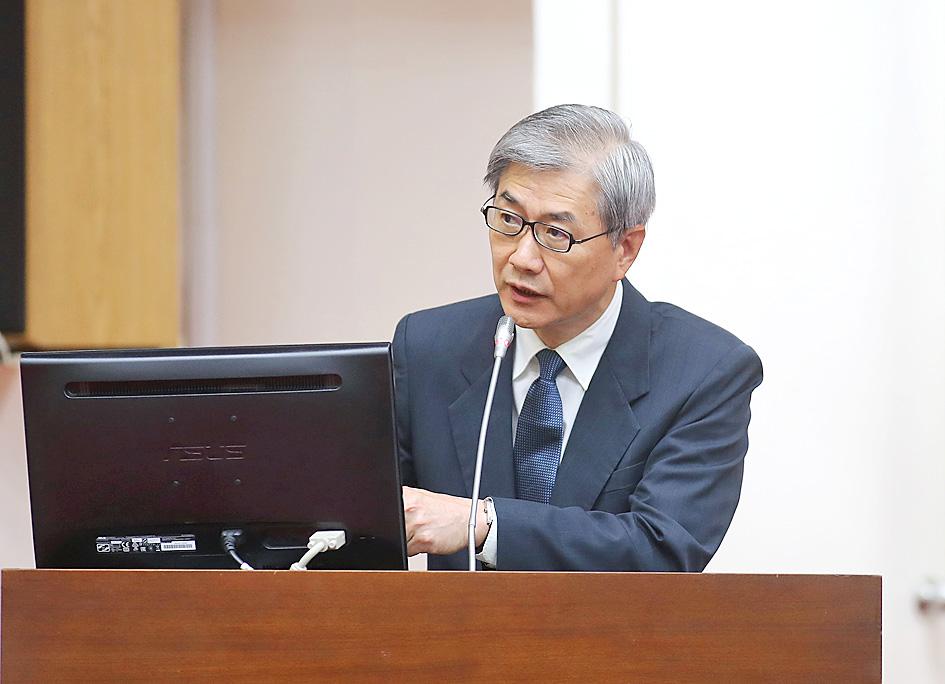The Financial Supervisory Commission (FSC) would inspect 25 companies to see if they have contravened regulations while selling products to senior citizens, commission Chairman Thomas Huang (黃天牧) said yesterday.
The commission selected 10 banks, six credit unions, six insurance companies and three securities companies for examination following a preliminary assessment, Huang told a meeting of the legislature’s Finance Committee in Taipei.
The commission would look into whether the companies have sold large amounts of high-risk financial products, such as high-yield bonds with low ratings or stocks-linked funds, to people over 65, Financial Examination Bureau Deputy Director-General Chang Tzy-hao (張子浩) said.

Photo: CNA
It would inspect whether the firms have promoted their products inappropriately, such as by encouraging clients to cancel fixed deposits in advance or to borrow money to buy the financial products, Chang said.
The commission would examine whether the companies have provided comprehensive information to clients about investment risks and the products’ content, he said.
The regulator would also check whether the firms have set anti-fraud mechanisms to confirm that their staff perform well and their clients are fully aware of investment risks, Chang said.
As senior citizens generally do not have a high risk appetite, companies should be more careful when selling risky products to them, he said.
“We are not saying that seniors must not buy risky products, but we want to ensure that financial companies understand their clients’ risk appetite and financial strength before selling products,” Huang said.
The fines for inappropriately selling financial products to senior citizens would be heavier than those imposed for selling such products to regular clients, he said.
Banks could be fined up to NT$50 million (US$1.8 million) if found to have contravened the regulations, while insurers could be fined NT$12 million, securities companies NT$4.8 million and credit unions could be fined NT$600,000, the commission said.
It has demanded that insurers record their marketing activities from beginning to end when selling investment-linked products to senior citizens.
The inspections are to begin later this month and end at the end of July, Chang said.

Intel Corp chief executive officer Lip-Bu Tan (陳立武) is expected to meet with Taiwanese suppliers next month in conjunction with the opening of the Computex Taipei trade show, supply chain sources said on Monday. The visit, the first for Tan to Taiwan since assuming his new post last month, would be aimed at enhancing Intel’s ties with suppliers in Taiwan as he attempts to help turn around the struggling US chipmaker, the sources said. Tan is to hold a banquet to celebrate Intel’s 40-year presence in Taiwan before Computex opens on May 20 and invite dozens of Taiwanese suppliers to exchange views

Application-specific integrated circuit designer Faraday Technology Corp (智原) yesterday said that although revenue this quarter would decline 30 percent from last quarter, it retained its full-year forecast of revenue growth of 100 percent. The company attributed the quarterly drop to a slowdown in customers’ production of chips using Faraday’s advanced packaging technology. The company is still confident about its revenue growth this year, given its strong “design-win” — or the projects it won to help customers design their chips, Faraday president Steve Wang (王國雍) told an online earnings conference. “The design-win this year is better than we expected. We believe we will win

Chizuko Kimura has become the first female sushi chef in the world to win a Michelin star, fulfilling a promise she made to her dying husband to continue his legacy. The 54-year-old Japanese chef regained the Michelin star her late husband, Shunei Kimura, won three years ago for their Sushi Shunei restaurant in Paris. For Shunei Kimura, the star was a dream come true. However, the joy was short-lived. He died from cancer just three months later in June 2022. He was 65. The following year, the restaurant in the heart of Montmartre lost its star rating. Chizuko Kimura insisted that the new star is still down

While China’s leaders use their economic and political might to fight US President Donald Trump’s trade war “to the end,” its army of social media soldiers are embarking on a more humorous campaign online. Trump’s tariff blitz has seen Washington and Beijing impose eye-watering duties on imports from the other, fanning a standoff between the economic superpowers that has sparked global recession fears and sent markets into a tailspin. Trump says his policy is a response to years of being “ripped off” by other countries and aims to bring manufacturing to the US, forcing companies to employ US workers. However, China’s online warriors